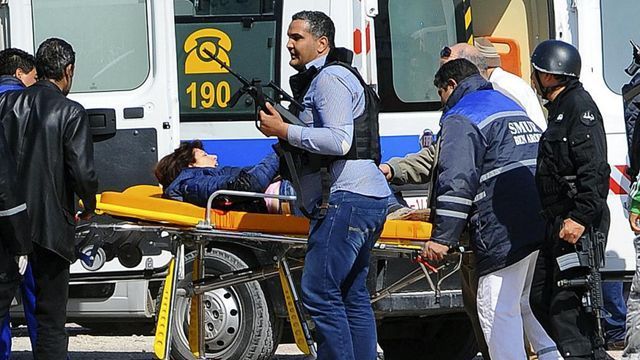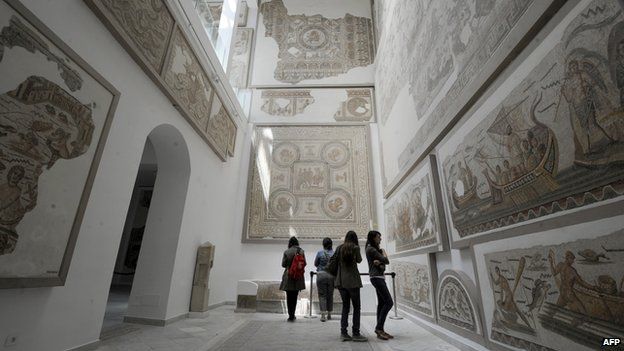 The injured were evacuated by rescue workersTunisia's president said late Wednesday that his country was "in a war with terror" and condemned what he described as "savage minority groups" after gunmen stormed a museum in the capital, Tunis, killing 23 people.
The injured were evacuated by rescue workersTunisia's president said late Wednesday that his country was "in a war with terror" and condemned what he described as "savage minority groups" after gunmen stormed a museum in the capital, Tunis, killing 23 people.
The deadliest attack on civilians in the North African country since 2002 began early Wednesday afternoon when two militants wearing military-style uniforms and wielding assault rifles burst from a vehicle and began gunning down tourists climbing out of buses at the National Bardo Museum.
The attackers, identified as Yassine Laabidi and Hatem Khachnaoui, then charged inside to take hostages before being killed in a firefight with security forces. Prime Minister Habib Essid said that said Laabidi had been flagged to intelligence, although not for "anything special."
Security forces guarded major thoroughfares Thursday while authorities hunted for two or three accomplices believed to have been involved in the attack. Two cruise ships whose passengers had been among the victims pulled out of the port of Tunis early Thursday. MSC Cruises said nine passengers from the Splendida were killed, 12 injured and six unaccounted for as its ship pulled out to the Mediterranean at sunrise. Another ship, the Costa Fascinosa, said 13 passengers had not returned on board when the ship left port overnight.
 The museum is a major attraction in TunisiaEssid said the gunmen killed 17 tourists — five from Japan, four from Italy, two from Colombia, two from Spain, and one each from Australia, Poland and France. The nationality of one dead foreigner was not released. Essid said two Tunisian nationals also were killed by the militants.
The museum is a major attraction in TunisiaEssid said the gunmen killed 17 tourists — five from Japan, four from Italy, two from Colombia, two from Spain, and one each from Australia, Poland and France. The nationality of one dead foreigner was not released. Essid said two Tunisian nationals also were killed by the militants.
Early Thursday, the Japanese government said that three of its citizens were killed and three others injured in the attack. Chief Cabinet Secretary Yoshihide Suga said Essid's earlier report of five Japanese dead turned out to be wrong after officials checked names by talking to the families traveling together and visiting hospitals. The names of the victims were not released.
At least 44 people were wounded, including tourists from Italy, France, Japan, South Africa, Poland, Belgium and Russia, according to Essid and doctors from Tunis' Charles Nicolle.
Twitter accounts associated with the Islamic State terror group based in Syria and Iraq (ISIS) were described as overjoyed at the attack, urging Tunisians to "follow their brothers," according to Rita Katz of SITE, a U.S.-based organization that monitors militant groups.
ISIS has not been believed to have a foothold in Tunisia, but has established a presence in neighboring Libya and Algeria. A counterterror analyst told Fox News that the museum attack may be linked to the death of Ahmed Rouissi, a senior ISIS commander in Libya whose body was found last week near the city of Sirte. Rouissi was a leading member of Tunisia's Ansar al-Sharia group and believed to be responsible for the killing of two Tunisian opposition leaders in 2013.
A disproportionately large number of Tunisian recruits — some 3,000, according to government estimates — have joined ISIS fighters in Syria and Iraq and many have received training in Libya.
Witnesses described the gunmen "shooting at anything that moved" inside the museum, which is Tunisia's largest. It is housed in a 15th century palace and boasts one of the world's largest collections of ancient Roman mosaics.
Dozens of tourists scrambled from the museum linking arms or clutching children as Tunisian police and security forces pointed their weapons at the building. The museum, 2½ miles from the city center, is located near the national parliament building, which was evacuated.
Hours after the police ended the siege, thousands of Tunisians flocked to downtown's landmark Bourguiba Avenue, where the revolution took place, for a nighttime rally. They chanted for a "Free Tunisia" in defiance of terrorism.
"I want the people of Tunisia to understand firstly and lastly that we are in a war with terror, and these savage minority groups will not frighten us," said newly elected President Beji Caid Essebsi in a televised address to the nation. "The fight against them will continue until they are exterminated."
Essid said the attack was an unprecedented assault on the economy. It came as Tunisia's all-important tourism business was starting to rebuild after drastic losses following the post-revolutionary turmoil. Numbers of arrivals for 2014 had begun to approach the levels of 2010 — before the revolution.
On Wednesday night, parliament held an extraordinary session where Speaker Mohammed Ennaceur called for the creation of a special fund to combat terrorism. He also called for the rapid passage of the anti-terror law that parliament had been debating when the attack took place.
North Africa analyst Geoff Porter said an attack on a tourism site has long been expected as the militants come under pressure from increasingly effective Tunisian security forces.
"Today's attack did not come out of nowhere. In fact, it comes amid ongoing counterterrorism efforts elsewhere in the country," he said about the attack. "Increasing pressure on terrorist activities ... may have squeezed the balloon, with terrorists seeking softer targets with more symbolic impact in the capital."
Source: foxnews
 В Атырау -10
В Атырау -10